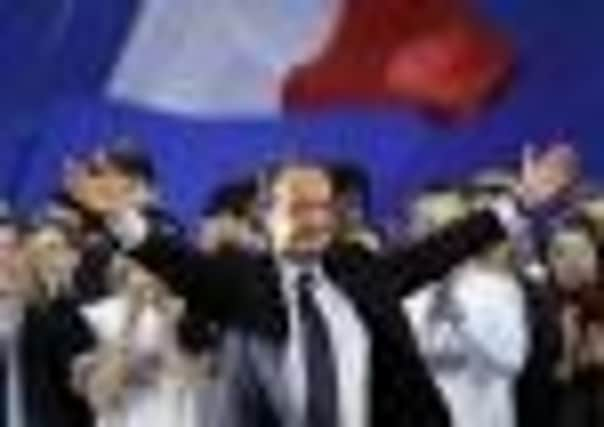George Kerevan: Election that could end the European dream


THIS month’s presidential elections in France are more important than usual. If the Socialist candidate, François Hollande, beats the incumbent, Nicolas Sarkozy, he has threatened to tear up the European Fiscal Compact. If he is serious, this could be the straw that finally breaks the back of the euro as a common currency. After that, the entire project for European unity could founder. Hang onto your wallet as well as your hat.
The Compact was agreed late last year, at Germany’s behest, to head off the euro crisis by committing EU members to legally-binding sovereign debt levels. This is supposed to bring stability to the eurozone and calm the markets. David Cameron, you will remember, opted out, to Germany’s disgust.
Advertisement
Hide AdAdvertisement
Hide AdIn the first few months of 2012, this plan seemed to be working. Europe’s big debtors – Spain, Italy and Portugal – found they could borrow more cheaply as the markets relaxed. Anyone who pointed out that the strict rules of the Compact would go out of the window if recession came – for example, the normally reliable Dutch – were told to shut up.
Meanwhile, off-stage in Paris, Hollande started making an unexpected nuisance of himself. He is the Clark Kent of the French Socialist Party. He is a classic product of the French elite education system (unlike Sarkozy), a special adviser to President Mitterrand in the 1980s and First Secretary of the French Socialist Party for 11 turbulent years. What Hollande, 57, lacks in charisma he makes up for in doggedness and bureaucratic efficiency.
Despite his longevity and seniority on the French official left, Hollande never seemed destined to be a presidential bride. His then domestic partner of 30 years, the firey Ségolène Royal, was the Socialist candidate in 2007 – losing badly to Sarkozy. This time round, the original front-runner for the Socialist nomination was the odious Dominique Strauss-Kahn, until the latter’s career imploded in sexual scandal last May.
No sooner had Hollande clinched the party nomination last October than he surprised everybody by tacking hard to the left. There will be a 75 per cent top rate of income tax and 60,000 new teachers. Fuel prices will be frozen and French troops pulled out of Afghanistan immediately. Hollande’s extra spending could cost upwards of 20 billion euros. Yet he also says he will balance the French budget by 2017.
Whatever you think of Hollande’s maths, his populist rhetoric has proven seductive. An opinion poll yesterday had him neck and neck with Sarkozy for the first voting round (22 April) and beating the incumbent by a comfortable 54 points to 46 in the run-off (6 May).
Of course, French Socialist candidates usually have to appeal to the left in the first round, in order to mobilise their natural constituency. They can afford to be more centrist in the second round when they are seeking to build a national majority. In like manner, Sarkozy has gone rightwards, exploiting the tragic Toulouse shootings in order to burnish his right-wing credentials.
However, Hollande is more boxed in politically than is usual and may be forced to the left once ensconced in the Elysée Palace. Remember, he was a close Mitterrand aide when the latter, in coalition with the French Communist Party, made an ill-fated attempt to nationalise key sectors of the French economy in the 1980s.
Hollande is under intense electoral pressure from a new force in French politics, the Left Front, led by Jean-Luc Mélenchon. The latter has come from nowhere to 15 per cent in the presidential polls, leading dissident Socialists, the old Communist Party and assorted Trotskyists. Mélenchon’s charismatic anti-capitalism has attracted support from young people normally disaffected by mainstream politicians. His terrier-like attacks on the far-right National Front of Marine Le Pen has pushed the latter into a humiliating fourth place in the presidential race.
Advertisement
Hide AdAdvertisement
Hide AdCome the second round of voting, Hollande can’t afford to temporise too much because he needs Mélenchon to tell his supporters to vote Socialist rather than stay at home. Above all, to get a working majority at the French parliamentary elections that follow in June, Hollande needs to form an electoral pact with the Left Front.
Which means that on the morning of 7 May Angela Merkel in Berlin may find herself on the phone to President Hollande discussing his demand for a renegotiation of the Fiscal Compact. The word “renegotiation” would ring alarm bells in the bond markets. Privately, Berlin has offered to include “add-ons” to the fiscal treaty, stressing economic growth provided Hollande does not use the “renegotiation” word in public. On Tuesday, Hollande’s campaign manager, Pierre Moscovici, concurred – blatant horse-trading which suggests Berlin has written off Sarkozy.
This does not mean Hollande has caved into Merkel’s austerity plan. He wants Berlin to agree to the European Investment Bank selling new collective eurobonds to finance massive infrastructure projects across Europe. This includes Project Helios, a €20bn plan to build a 200sq km solar power array in Greece, to generate renewable energy for Europe – and save the Greek economy (so goodbye, Scottish offshore generation plans?).
Why would Merkel agree? Under German constitutional law, the Compact requires a two-thirds majority in the Bundestag. But the German Socialists are delaying ratification in the hope Hollande wins. Then they will combine forces to push for fiscal expansion across Europe. If this “alternative vision” stimulates opposition to austerity across southern Europe, all bets are off. The bond markets will go crazy. Greece (and others) could be forced out of the eurozone. Europe could end up with a more rational monetary system, but getting there will be stormy.
At heart, Hollande is a “good European”. I expect eventually he will blink before risking a firestorm in the bond markets. Yet by then it might be too late. He could be facing a new May ’68, with France’s left on the streets again.